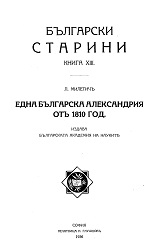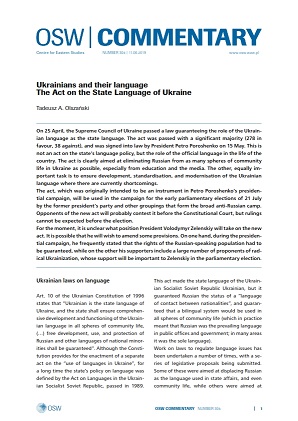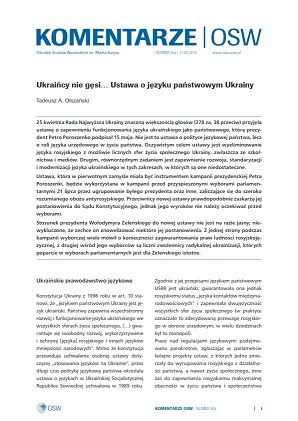
ЕДНА БЪЛГАРСКА АЛЕКСАНДРИЯ ОТЪ 1810 ГОД.
Published in 1936 by the Bulgarian Academy of Sciences (Department for History and Philology) as vol 13 of the series "Bulgarian Old Age" (БЪЛГАРСКИ СТАРИНИ, КНИГА XIII)
More...We kindly inform you that, as long as the subject affiliation of our 300.000+ articles is in progress, you might get unsufficient or no results on your third level or second level search. In this case, please broaden your search criteria.

Published in 1936 by the Bulgarian Academy of Sciences (Department for History and Philology) as vol 13 of the series "Bulgarian Old Age" (БЪЛГАРСКИ СТАРИНИ, КНИГА XIII)
More...
On 25 April, the Supreme Council of Ukraine passed a law guaranteeing the role of the Ukrainian language as the state language. The act was passed with a significant majority (278 in favour, 38 against), and was signed into law by President Petro Poroshenko on 15 May. This is not an act on the state’s language policy, but the role of the official language in the life of the country. The act is clearly aimed at eliminating Russian from as many spheres of community life in Ukraine as possible, especially from education and the media. The other, equally important task is to ensure development, standardisation, and modernisation of the Ukrainian language where there are currently shortcomings. The act, which was originally intended to be an instrument in Petro Poroshenko’s presidential campaign, will be used in the campaign for the early parliamentary elections of 21 July by the former president’s party and other groupings that form the broad anti-Russian camp. Opponents of the new act will probably contest it before the Constitutional Court, but rulings cannot be expected before the election. For the moment, it is unclear what position President Volodymyr Zelenskiy will take on the new act. It is possible that he will wish to amend some provisions. On one hand, during the presidential campaign, he frequently stated that the rights of the Russian-speaking population had to be guaranteed, while on the other his supporters include a large number of proponents of radical Ukrainization, whose support will be important to Zelenskiy in the parliamentary election.
More...
25 kwietnia Rada Najwyższa Ukrainy znaczną większością głosów (278 za, 38 przeciw) przyjęła ustawę o zapewnieniu funkcjonowania języka ukraińskiego jako państwowego, którą prezydent Petro Poroszenko podpisał 15 maja. Nie jest to ustawa o polityce językowej państwa, lecz o roli języka urzędowego w życiu państwa. Oczywistym celem ustawy jest wyeliminowanie języka rosyjskiego z możliwie licznych sfer życia społecznego Ukrainy, zwłaszcza ze szkolnictwa i mediów. Drugim, równorzędnym zadaniem jest zapewnienie rozwoju, standaryzacji i modernizacji języka ukraińskiego w tych zakresach, w których są one niedostateczne. Ustawa, która w pierwotnym zamyśle miała być instrumentem kampanii prezydenckiej Petra Poroszenki, będzie wykorzystana w kampanii przed przyspieszonymi wyborami parlamentarnymi 21 lipca przez ugrupowanie byłego prezydenta oraz inne, zaliczające się do szeroko rozumianego obozu antyrosyjskiego. Przeciwnicy nowej ustawy prawdopodobnie zaskarżą jej postanowienia do Sądu Konstytucyjnego, jednak jego wyroków nie należy oczekiwać przed wyborami. Stosunek prezydenta Wołodymyra Zełenskiego do nowej ustawy nie jest na razie jasny; niewykluczone, że zechce on znowelizować niektóre jej postanowienia. Z jednej strony podczas kampanii wyborczej wiele mówił o konieczności zagwarantowania praw ludności rosyjskojęzycznej, z drugiej wśród jego wyborców są liczni zwolennicy radykalnej ukrainizacji, których poparcie w wyborach parlamentarnych jest dla Zełenskiego istotne.
More...
Articles, pictures and interviews can be reprinted only with the consent of the publisher.
More...
The article presents personal seals from Bulgarian settlements in the South-Eastern Rhodopes and in Western Thrace dating from the end of the 19th and the beginning of the 20th century. The inscriptions of the seals,their graphic features and their layout are examined. The writing patterns of the anthroponyms on the personal seals and in the texts on which they are placed are described.
More...
In the present study, lexis in the field of financial-monetary and commercial relations is presented in Modern Bulgarian texts from the period 18th and 19th century. The aim of the work is to trace the state and character of the vocabulary in the selected topic during the considered period.
More...
As an object of research, the lexical richness of the South-Western Bulgarian dialects attracts a considerable philological interest on behalf of such prominent figures as Yordan Hadzhikonstantinov-Dzhinot, Stefan Verkovich, Lyuben Karavelov, Vasil Cholakov who focus upon both public life and relation between the written and spoken form of the language characteristic of the third quarter of the 19th century. This richness is studied in a number of publications to be found in the periodicals from that period and presented in the form of integral components or small dialect dictionaries appended to the folklore collections. This interest is provoked by the archaic traits of these dialects preserving vivid traces of the old Bulgarian heritage, on the one hand, and, on the other, by the focus on the Bulgarian dialects characterizing the period of Bulgarian national revival in connection to the establishing of the standardized Bulgarian literary language in which, to a greater or lesser extent, the characteristic features of the Eastern Bulgarian dialects start to dominate in the new linguistic normativity.
More...